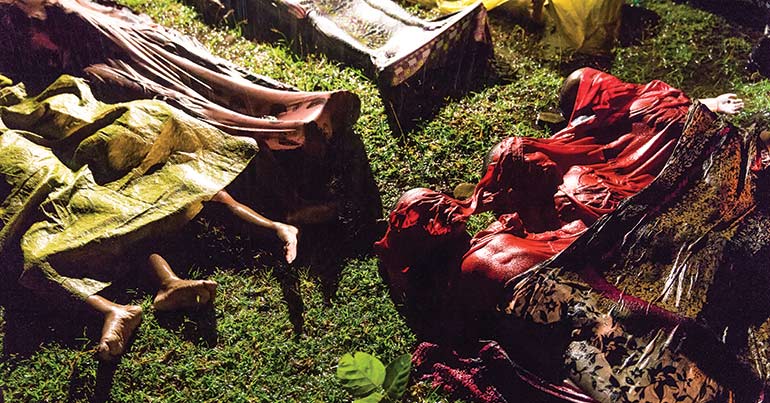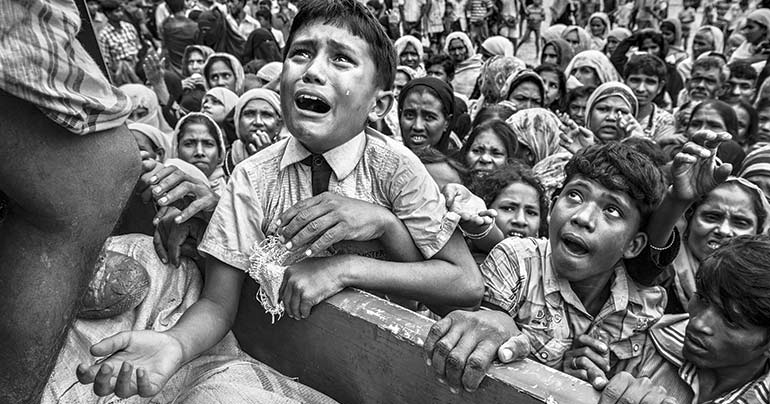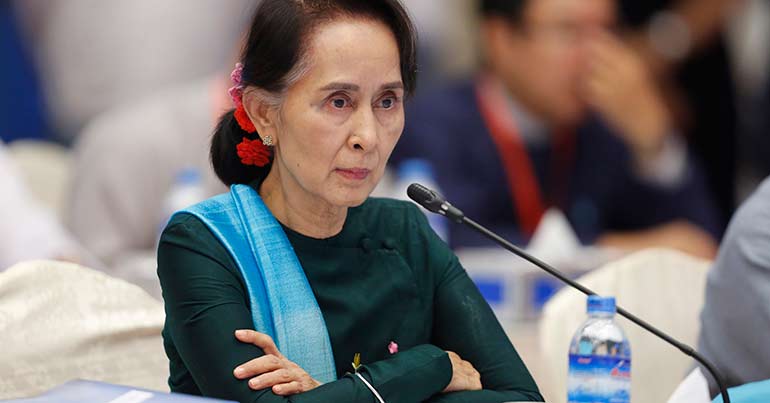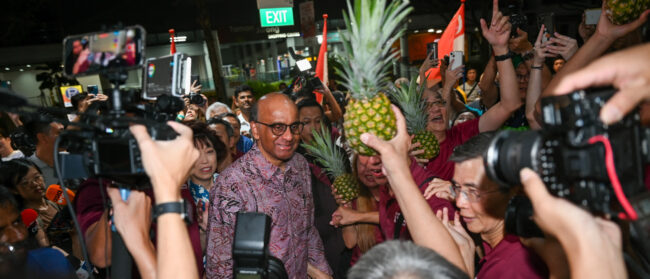In the country they called home, they lived in fear and were denied rights other citizens take for granted. In August, they began to flee violence orchestrated by the army and Buddhist mobs that burnt their homes and destroyed entire villages. The perpetrators of the violence raped and maimed, shot and killed.
Hundreds of thousands of Rohingya Muslims from Myanmar have paid a high price for an attack on police and army posts by a small group of extremists known as the Arakan Rohingya Salvation Army (ARSA). The Myanmar military’s response has been brutal, and refugees have since flooded Cox’s Bazar in neighbouring Bangladesh.
Aid agencies estimate that nearly 900,000 Rohingya, of whom 700,000 are new arrivals, live in refugee camps there, and UN rights chief Zeid Ra’ad al-Hussein warned in February that the crisis poses a risk to regional security. There doesn’t seem to be an end in sight for the plight of the refugees, though a repatriation deal was signed as far back as November – while thousands of refugees were still flooding across the border. A joint working group was to be set up within three weeks and the repatriation was slated to begin in January. However, that announcement was immediately followed by reports that logistical constraints had delayed the exercise, perhaps indefinitely.
“The [Bangladeshi] government has postponed the repatriation until further notice. And the UN – everybody in the UN – says: ‘We cannot repatriate anyone until the [correct] conditions in the home country… are in place,’” Benjamin Steinlechner, Unicef’s spokesman overseeing communications and outreach programmes in Cox’s Bazar, told Southeast Asia Globe.
Myanmar continues to prevent human rights groups and journalists from visiting Rakhine State, the scene of the violence and home to the majority of the Rohingya. Nonetheless, evidence that security forces committed atrocities, which human rights groups say may constitute war crimes, continues to emerge and has led to calls for repatriation to be voluntary and dignified.
“Any repatriation that does go ahead must be voluntary; otherwise Bangladesh will be breaching international protocol on returning refugees to sites where they face a risk of threats to their lives,” Francis Wade, a journalist and author of Myanmar’s Enemy Within, told Southeast Asia Globe.

Wade said reports of mass graves near Rohingya villages have surfaced, adding: “The communal dynamic in Rakhine State remains highly volatile, [meaning] that the potential for a repeat of the mob violence of recent years – if not a military campaign – is high.”
The Myanmar government wants to set up temporary camps until the Rohingya refugees are rehabilitated, said Meenakshi Ganguly, Human Rights Watch’s director for South Asia. But the refugees, she added, fear they could end up in military-run camps, basically returning to the custody of the very people that brutalised them.
“What is needed is for the Burmese authorities to ensure that people are able to return to their homes in safety. For that, these terrible crimes need to be investigated, and those responsible held to account,” she said.
Discrimination, such as the Myanmar state refusing to use the term Rohingya, as well as their exclusion from the official list of the country’s 135 ethnic groups, is uppermost in the minds of many refugees in Bangladesh. Although conditions in the refugee camps are dire, some refugees have said they will never go back home.
“If you ask refugees, their answers vary from: ‘Yes, absolutely,’ to: ‘No, never.’ Some refugees will tell you they are willing to go back and want to go back under the right conditions,” said Unicef’s Steinlechner, who has worked in Cox’s Bazar for three months. “They always say they will go back once it is safe… and once they get their rights, full rights, as citizens. Others have gone through atrocities that are really beyond imagination… The people who just arrived said they would rather die here than go back.”
Repatriation was always going to be a daunting task. Returning 700,000 refugees to Myanmar over a period of two years would mean that at least 30,000 refugees are repatriated every month. The financial burden would be huge, and it is not clear exactly who would meet the cost. Zaw Htay, spokesperson of the Myanmar State Counsellor’s Office, didn’t respond to requests for an interview, and the Bangladeshi ambassador to Myanmar could not be reached for comment.

Meanwhile, in another barrier to potential repatriation to Rakhine, food insecurity and undernutrition have persisted in the state, says the World Food Programme (WFP), one of the few foreign agencies allowed by the Myanmar government to distribute relief aid. The WFP said child malnutrition rates in the district of Maungdaw were above emergency thresholds even before the violence broke out and that the fighting and displacement of people had affected the already poor nutritional status.
“We are concerned about food insecurity and undernutrition in Rakhine State, especially for the health of women and children,” Arsen Sahakyan, head of communications for the WFP in Myanmar, told Southeast Asia Globe.
Worse, the Myanmar military “is in effect starving out the remaining population through denying access to rice fields at harvest time, destroying or blocking access to markets and severely restricting aid access”, said Matthew Wells, senior crisis advisor at Amnesty International.
Indeed, the organisation’s field research carried out from 17-31 January in the Bangladesh refugee camps suggests more Rohingya have continued to flee Myanmar.
Wells added that as a shortage of food makes more Rohingya families leave for Bangladesh, the Myanmar security forces are delivering what he called a final blow: the “systematic theft at checkpoints of money and other valuables”.
“The military’s ongoing actions appear designed toward the same goal that defined its acute campaign of violence in late August and September: to make northern Rakhine State unliveable for the Rohingya population,” he said.
Wells said that the mooted plans for repatriation were “alarmingly premature” and blamed the international community for not doing enough to resolve the crisis, saying it has failed to put enough pressure on Myanmar’s military to stop its “ethnic cleansing”. Targeted financial sanctions, he said, are urgently needed to send a message that violations will not be tolerated.

Reports of ethnic cleansing are corroborated by Human Rights Watch (HRW), which, after being denied access, used satellite imagery to document the arson attacks inside Rakhine State and found that hundreds of Rohingya settlements were burned to the ground, said Ganguly, the group’s South Asia director.
Graziella Leite Piccoli, communications and public relations officer for the International Committee of the Red Cross (ICRC) Asia division, said repatriation would only be a durable solution if it ensured safety and dignity. The ICRC has provided food and water to affected communities in Rakhine State, but Piccoli said humanitarian needs remain enormous and that markets and shops remain closed. “If you move to rural areas, markets have been disrupted as trade and investment has stopped. ICRC teams are trying to help people and communities, and we focus on being truly impartial with regards to the effects of this violence on different communities,” she told Southeast Asia Globe.
In Bangladesh, Unicef has improved access to health facilities, said spokesman Steinlechner, but deaths have occurred due to disease outbreaks, sporadic violence and elephants raiding refugees’ makeshift camps.
“These people need a lot of support. Bangladeshi authorities are doing a lot of good work, but as of now, these people are all crowded into a small area in rather squalid conditions. Experts fear that once the monsoon starts in a few months, there is risk of flooding, landslides and disease,” said HRW’s Ganguly.
Even for a people forced to live in such atrocious conditions, returning to the place they call home is perhaps even less desirable. After all, the choice between living in fear and living in destitution really is no choice at all.


